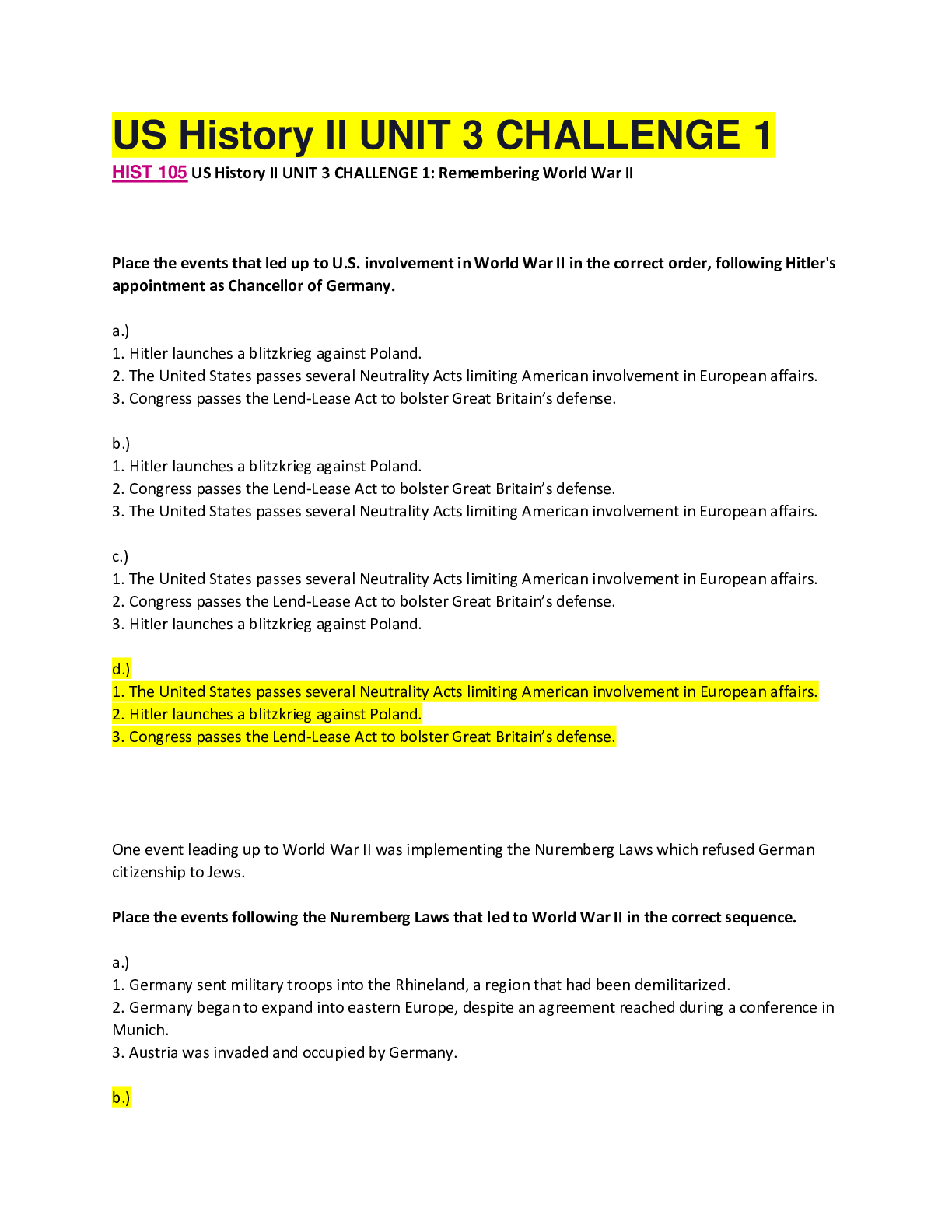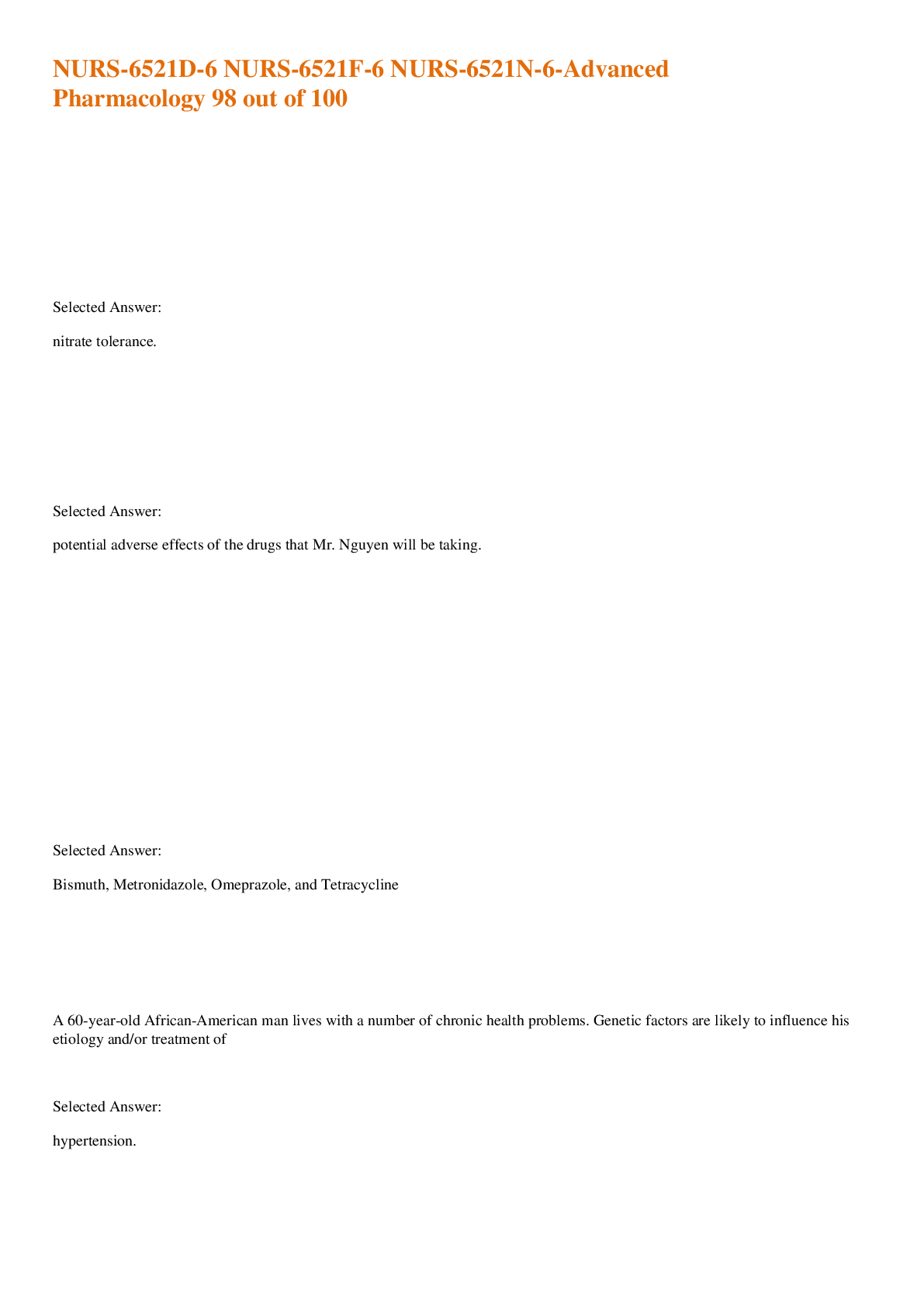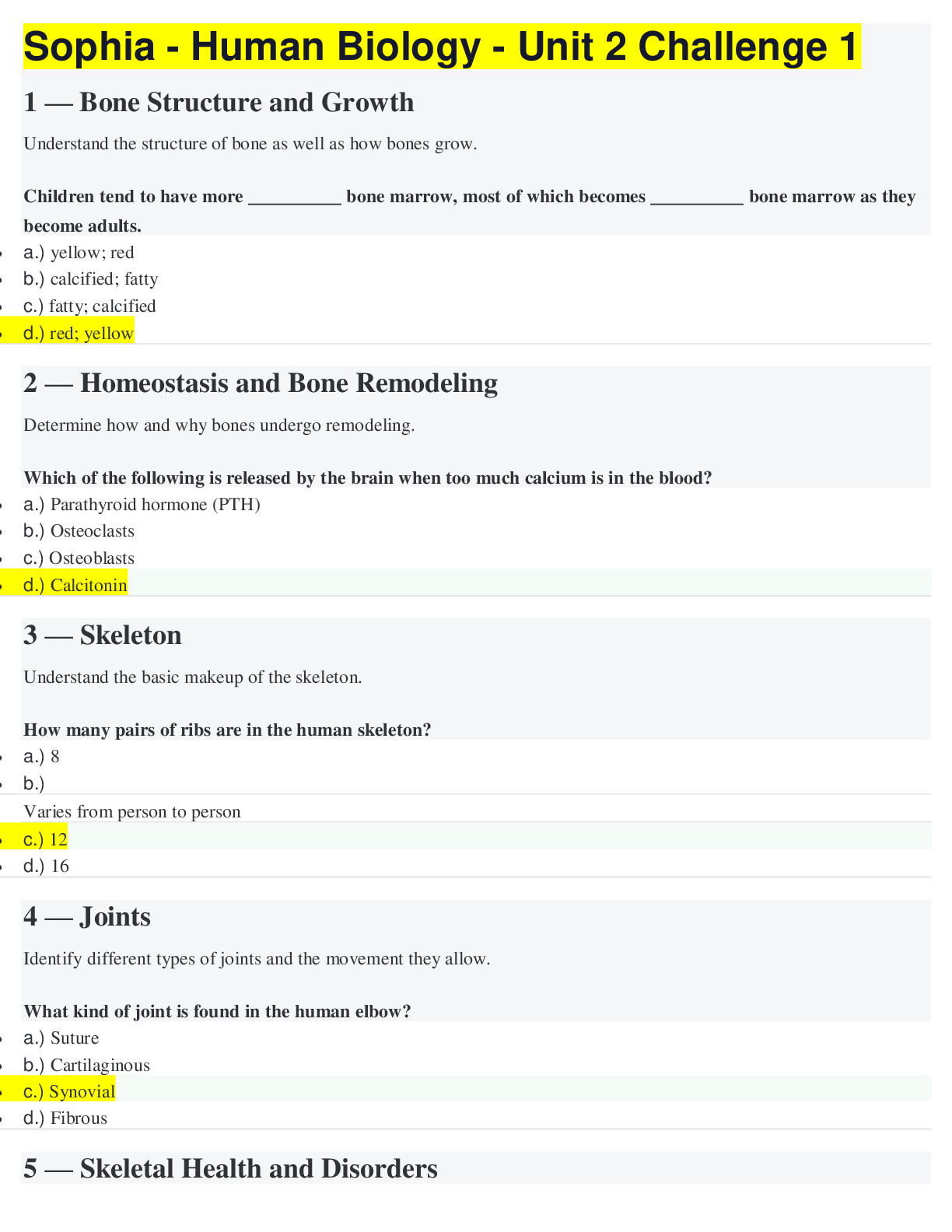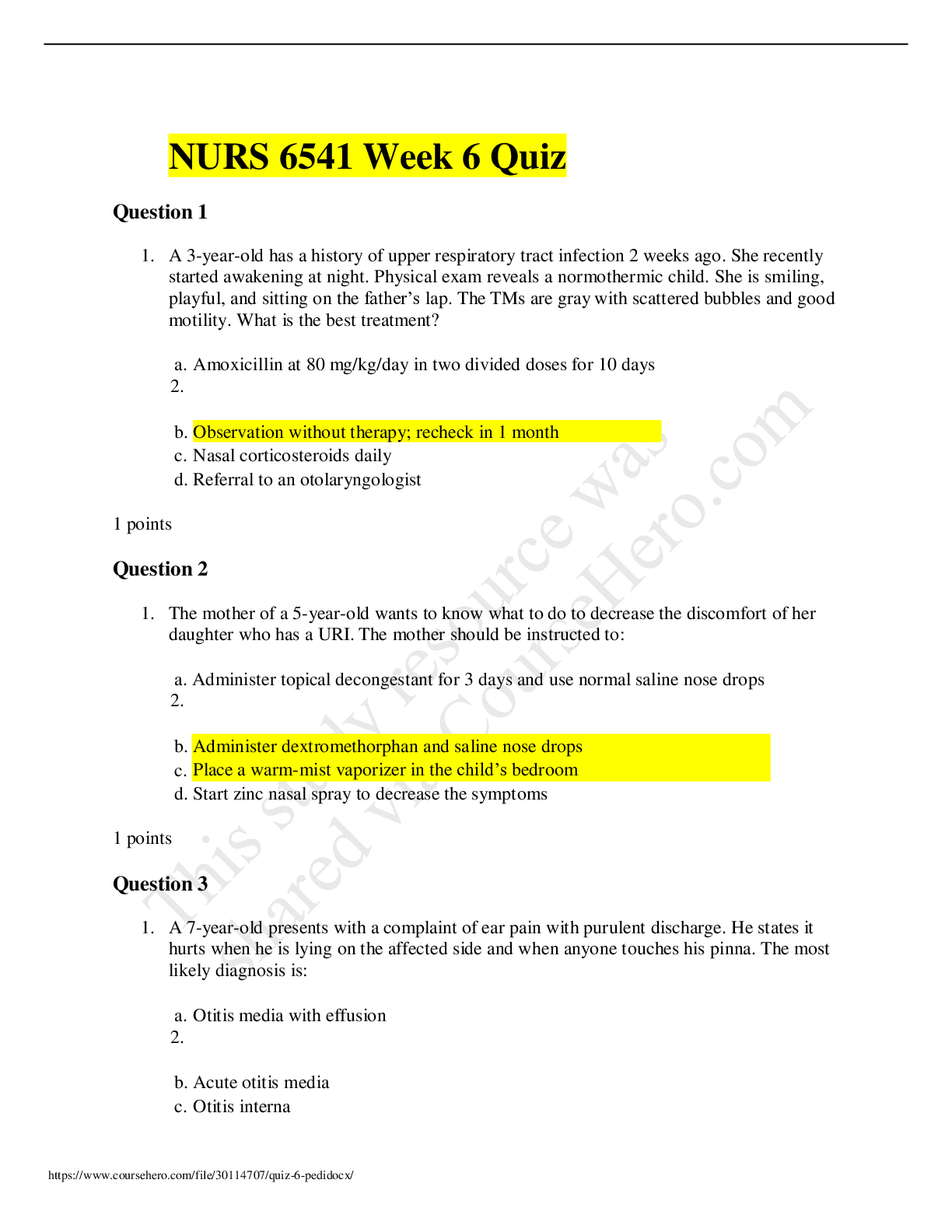History > EXAM > Strayer University - HIST 105 US History II UNIT 3 CHALLENGE 1 QUESTION AND ANSWERS (All)
Strayer University - HIST 105 US History II UNIT 3 CHALLENGE 1 QUESTION AND ANSWERS
Document Content and Description Below
US History II UNIT 3 CHALLENGE 1 HIST 105 US History II UNIT 3 CHALLENGE 1: Remembering World War II Place the events that led up to U.S. involvement in World War II in the correct order, foll... owing Hitler's appointment as Chancellor of Germany. a.) 1. Hitler launches a blitzkrieg against Poland. 2. The United States passes several Neutrality Acts limiting American involvement in European affairs. 3. Congress passes the Lend-Lease Act to bolster Great Britain’s defense. b.) 1. Hitler launches a blitzkrieg against Poland. 2. Congress passes the Lend-Lease Act to bolster Great Britain’s defense. 3. The United States passes several Neutrality Acts limiting American involvement in European affairs. c.) 1. The United States passes several Neutrality Acts limiting American involvement in European affairs. 2. Congress passes the Lend-Lease Act to bolster Great Britain’s defense. 3. Hitler launches a blitzkrieg against Poland. d.) 1. The United States passes several Neutrality Acts limiting American involvement in European affairs. 2. Hitler launches a blitzkrieg against Poland. 3. Congress passes the Lend-Lease Act to bolster Great Britain’s defense. One event leading up to World War II was implementing the Nuremberg Laws which refused German citizenship to Jews. Place the events following the Nuremberg Laws that led to World War II in the correct sequence. a.) 1. Germany sent military troops into the Rhineland, a region that had been demilitarized. 2. Germany began to expand into eastern Europe, despite an agreement reached during a conference in Munich. 3. Austria was invaded and occupied by Germany. b.) 1. Germany sent military troops into the Rhineland, a region that had been demilitarized. 2. Austria was invaded and occupied by Germany. 3. Germany began to expand into eastern Europe, despite an agreement reached during a conference in Munich. c.) 1. Germany began to expand into eastern Europe, despite an agreement reached during a conference in Munich. 2. Germany sent military troops into the Rhineland, a region that had been demilitarized. 3. Austria was invaded and occupied by Germany. d.) 1. Germany began to expand into eastern Europe, despite an agreement reached during a conference in Munich. 2. Austria was invaded and occupied by Germany. 3. Germany sent military troops into the Rhineland, a region that had been demilitarized. Select an argument used to oppose U.S. involvement in World War II. a.) The United States must honor the nonaggression pact it signed with Germany after World War I. b.) The United States does not want to threaten its economic trade agreements with Germany. c.) Isolationists in Congress refuse to approve any military interference in any foreign country. d.) The war is a struggle among Europeans in which the United States has no vested interest. Select an argument used in favor of U.S. involvement in World War II. a.) U.S. military intervention would quickly defeat the Germans. b.) The rise and spread of fascism threatens the entire globe. c.) The United States waited too long to enter World War I. d.) As the world's greatest power, the U.S. has an obligation to step in. Choose the statement that describes a cause of the Japanese attack on Pearl Harbor. a.) Roosevelt insisted that Japan end its alliance with Germany. b.) To protect its interests in the Pacific, the U.S. imposed economic sanctions against Japan. c.) Japanese Americans were involuntarily detained in the U.S. d.) The U.S. urged China to intervene in Japan's empire-building in the Pacific. Which of the following was an effect of the attack on Pearl Harbor? a.) Great Britain entered World War II. b.) Japan invaded the U.S. mainland. c.) The U.S. created internment camps for Japanese Americans. d.) The U.S. began to send aid to China. Choose the statement that best reflects the experience of women as a social group after the United States entered World War II. a.) “We, both single and married, comprised over 30% of the domestic workforce during the war.” b.) “It was deeply traumatizing to leave our possessions behind and live in overcrowded internment camps." c.) “The war ended the economic depression that had kept us struggling and in poverty since the 1920s.” d.) “We arranged a March on Washington to protest our exclusion from jobs in wartime industries.” Choose the statement that best reflects the experiences of African Americans after the United States entered World War II. a.) “Over 90% of us were relocated against our will to assembly centers during the war.” b.) “We were faced with the possibility of deportation even though we were U.S. citizens.” c.) “We began a civil rights campaign to achieve both a victory in Europe and a victory over racism in the U.S." d.) “Although our wages were far lower, we earned more money than we ever had before in the workplace.” Choose the statement that best reflects the experiences of Japanese Americans after the United States entered World War II. a.) “We found financial self-reliance, which was new for us, after we went to work in the defense industry.” b.) “We arranged sit-ins and other protests around Washington, D.C., as a part of our Double V Campaign.” c.) “We were forced by the government to move from California because they feared we might be capable of sabotage or espionage.” d.) "Despite wartime mobilization, we continued to feel the negative effects of the Great Depression." Choose the statement that accurately reflects the relationship between private business and the federal government during World War II. a.) "The government rejected deficit spending as a way to finance war production." b.) "Most defense contracts went to small businesses like the one I own." c.) “Since the government guaranteed a profit on sales, our corporation accepted a defense contract.” d.) "The federal government encouraged us to continue producing consumer goods to keep American citizens happy." Choose the statement that describes an economic consequence of the United States as an "arsenal of democracy." a.) "I thought the government should have adopted deficit spending during the war instead of focusing on keeping a balanced budget." b.) "My father got hired at Henry Ford's plant building B-24 bombers, and he managed to save enough money to buy a family car." c.) "My uncle worked as a ship builder and told me about how President Roosevelt nationalized the shipping and shipbuilding industries." d.) "Because taxes on income were lowered for the middle class, the wealthy, like my family, bore the brunt of funding the war effort." Choose the statement that describes an economic consequence of the United States as an "arsenal of democracy." a.) "Corporations and business owners used the assembly line to tackle production on a massive scale." b.) "The group that benefited most, economically, from wartime production was U.S soldiers." c.) "The government should have adopted deficit spending during the war to boost the economy instead of focusing on keeping a balanced budget." d.) "As the war continued, the economy weakened, leaving most working American families poor." Why did the three major Allies—the United States, Great Britain and the Soviet Union—want to launch a "second front" in Europe? a.) To invade and occupy Italy b.) To show unity among world powers c.) To divide the German army d.) To protect Soviet troops in France Why was the United States reluctant to launch a land invasion of Japan? a.) By capturing nearby islands, the U.S. could install military bases to keep Japan in check. b.) Savage fighting and heavy American casualties occurred in the battles on Iwo Jima and Okinawa. c.) American soldiers could not get close enough to Japan to launch an effective invasion. d.) Japan had a larger army and more airplanes and submarines than the Americans. Choose which phrase was a factor in President Truman's decision to drop atomic bombs on Japan. a.) Prevention of Soviet expansion in Asia b.) Congress demanded an immediate end to the war c.) Japan had also developed the atomic bomb d.) Pressure from China Why were Hiroshima and Nagasaki chosen as the targets for nuclear attacks? a.) They were the largest population centers in Japan. b.) They were historically significant. c.) They were chosen randomly. d.) They had significant military value that helped to keep Japan in the war. [Show More]
Last updated: 2 years ago
Preview 1 out of 8 pages

Buy this document to get the full access instantly
Instant Download Access after purchase
Buy NowInstant download
We Accept:

Reviews( 0 )
$13.50
Can't find what you want? Try our AI powered Search
Document information
Connected school, study & course
About the document
Uploaded On
Sep 25, 2020
Number of pages
8
Written in
Additional information
This document has been written for:
Uploaded
Sep 25, 2020
Downloads
0
Views
127

.png)




















.png)

.png)

